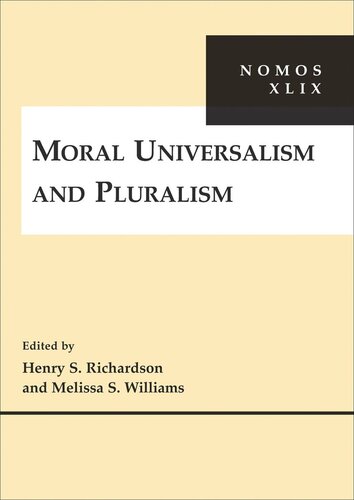

Most ebook files are in PDF format, so you can easily read them using various software such as Foxit Reader or directly on the Google Chrome browser.
Some ebook files are released by publishers in other formats such as .awz, .mobi, .epub, .fb2, etc. You may need to install specific software to read these formats on mobile/PC, such as Calibre.
Please read the tutorial at this link: https://ebookbell.com/faq
We offer FREE conversion to the popular formats you request; however, this may take some time. Therefore, right after payment, please email us, and we will try to provide the service as quickly as possible.
For some exceptional file formats or broken links (if any), please refrain from opening any disputes. Instead, email us first, and we will try to assist within a maximum of 6 hours.
EbookBell Team

5.0
18 reviewsMoral universalism, or the idea that some system of ethics applies to all people regardless of race, color, nationality, religion, or culture, must have a plurality over which to range a plurality of diverse persons, nations, jurisdictions, or localities over which morality asserts a universal authority. The contributors to Moral Universalism and Pluralism, the latest volume in the NOMOS series, investigate the idea that, far from denying the existence of such pluralities, moral universalism presupposes it. At the same time, the search for universally valid principles of morality is deeply challenged by diversity. The fact of pluralism presses us to explore how universalist principles interact with ethical, political, and social particularisms. These important essays refuse the answer that particularisms should simply be made to conform to universal principles, as if morality were a mold into which the diverse matter of human society and culture could be pressed. Rather, the authors bring philosophical, legal and political perspectives to bear on the core questions: Which forms of pluralism are conceptually compatible with moral universalism, and which ones can be accommodated in a politically stable way? Can pluralism generate innovations in understandings of moral duty? How is convergence on the validity of legal and moral authority possible in circumstances of pluralism? As the contributors to the book demonstrate in a wide variety of ways, these normative, conceptual, and political questions deeply intertwine.
Contributors: Kenneth Baynes, William A. Galston, Barbara Herman, F. M. Kamm, Benedict Kingsbury, Frank I. Michelman, William E. Scheuerman, Gopal Sreenivasan, Daniel Weinstock, and Robin West.